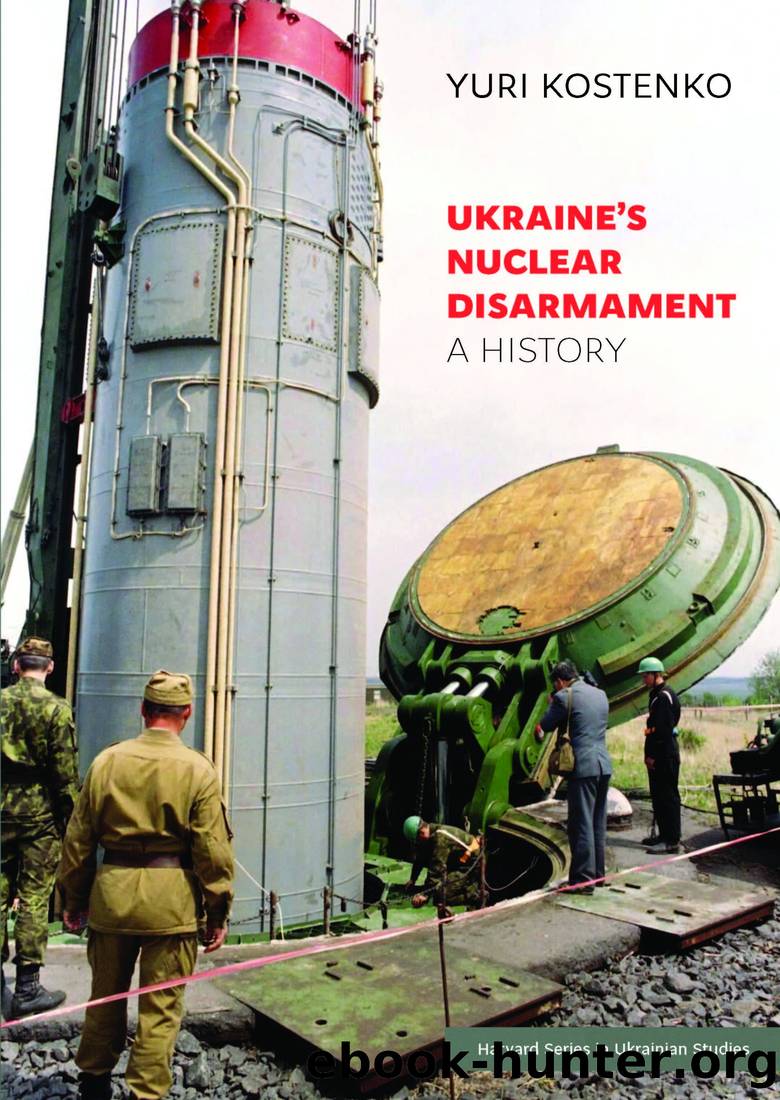Ukraine's Nuclear Disarmament by Yuri Kostenko

Author:Yuri Kostenko [Kostenko, Yuri]
Language: eng
Format: epub
Publisher: Harvard University Press
Published: 2020-10-13T16:48:34+00:00
The Battle of 3 June: The Hawksâ Move
The foreign ministerâs open confrontation with the legislature had failed, resulting in no security guarantees, no funding, no distribution of reduction quotas according to the Lisbon Protocol. Everything was just vague prospects that required the two treaties be ratified first, so that the international community would not suspect Ukraine of aggressive intent. It was now the hawksâ move.
During the open session, First Deputy Speaker Vasyl´ Durdynets´, who was curator of our working group, took the podium on behalf of Parliament leadership. I was to speak during the closed session and present the Working Groupâs position. And so, the two of us divided up various aspects of the issue in such a way as to neither repeat ourselves, nor omit anything significant. Our reports, point for point, captured the entire set of arguments that the âhawksâ had intended to convey to the members of the legislature.
Durdynets´ argued that it was highly unfair to accuse Ukraine of playing a double game, of declaring its intentions to acquire nonnuclear status, while at the same time delaying the process of ratifying the nuclear treaties. He pointed out that the parliament had started working on this on 20 July 1992, just five months before Parliamentâs Executive Committee passed its resolution to set up a working group, while during this time, all the ministries, agencies, parliamentary commissions and independent experts were being provided with materials analyzing different aspects of the two treaties. Durdynets´ categorically objected to rushing the process, especially as START was a technically complicated document that had been drafted during the course of nine years of difficult negotiations. Moreover, representatives of Ukraine, and even the Ukrainian SSR, never had access to these negotiations, although now the countryâs national security depended on this treaty.
Durdynets´ insisted that only after a comprehensive study was completed would it be possible to discuss specific timeframes for a legislative review. Whatever the final decision was or when it would be made, he said, would have to be guided by the interests people and the state of Ukraine.
Durdynets´ went on to the specifics of key issues that needed to be clarified before it could be brought up for debate in the legislature. This included proper guarantees for national security after disarmament and distinct sources of funding for the nuclear arms reduction program, commented on by Zlenko with an aside that US $175 million was completely inadequate, based on preliminary calculations that were in the billions. Another key issue was the possibility of recycling or repurposing the nuclear material removed from warheads, as the deputy speaker believed simply moving them to Russia was an unacceptable option for Ukraine. Finally, he also pointed out, the MFA had not sat down at the negotiating table with Russia, Belarus, and Kazakhstan to discuss how to divide up the reduction quotas, as the Lisbon Protocol required; without the aforementioned, there was no basis for reduction. After all, neither START nor the Lisbon Protocol âcontains a formulation that directly requires Ukraine to destroy even a single missile.
Download
This site does not store any files on its server. We only index and link to content provided by other sites. Please contact the content providers to delete copyright contents if any and email us, we'll remove relevant links or contents immediately.
| Biological & Chemical | Conventional |
| Nuclear |
The Radium Girls by Kate Moore(12026)
100 Deadly Skills by Clint Emerson(4924)
Rise and Kill First by Ronen Bergman(4785)
The Templars by Dan Jones(4689)
The Doomsday Machine by Daniel Ellsberg(4489)
The Rape of Nanking by Iris Chang(4211)
Killing England by Bill O'Reilly(4001)
Stalin by Stephen Kotkin(3965)
Hitler in Los Angeles by Steven J. Ross(3946)
12 Strong by Doug Stanton(3548)
Hitler's Monsters by Eric Kurlander(3341)
Blood and Sand by Alex Von Tunzelmann(3203)
The Code Book by Simon Singh(3189)
Darkest Hour by Anthony McCarten(3129)
The Art of War Visualized by Jessica Hagy(3007)
Hitler's Flying Saucers: A Guide to German Flying Discs of the Second World War by Stevens Henry(2754)
Babylon's Ark by Lawrence Anthony(2676)
The Second World Wars by Victor Davis Hanson(2524)
Tobruk by Peter Fitzsimons(2516)
